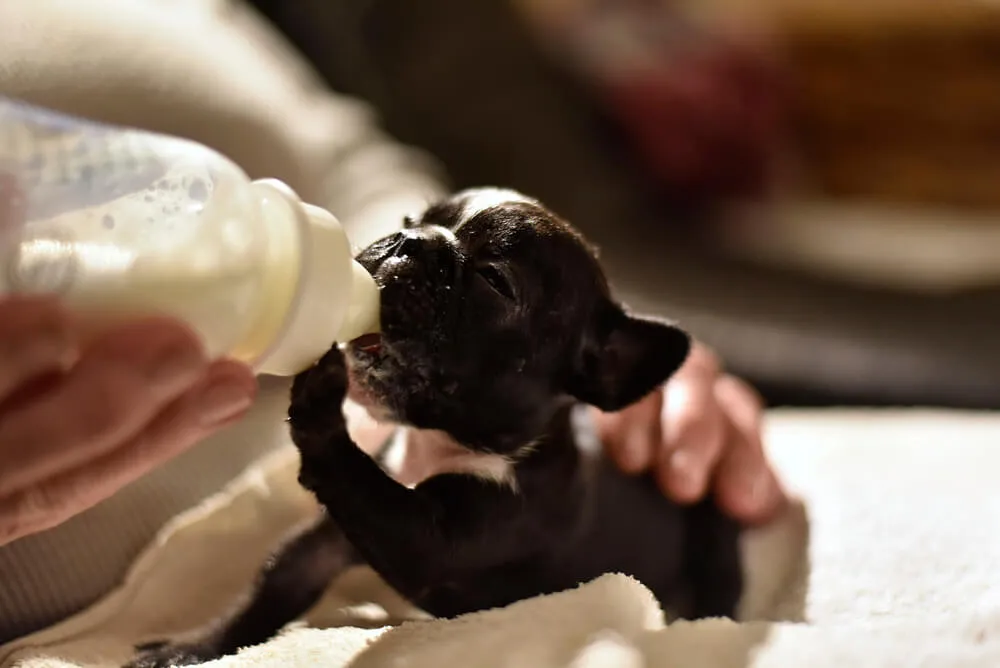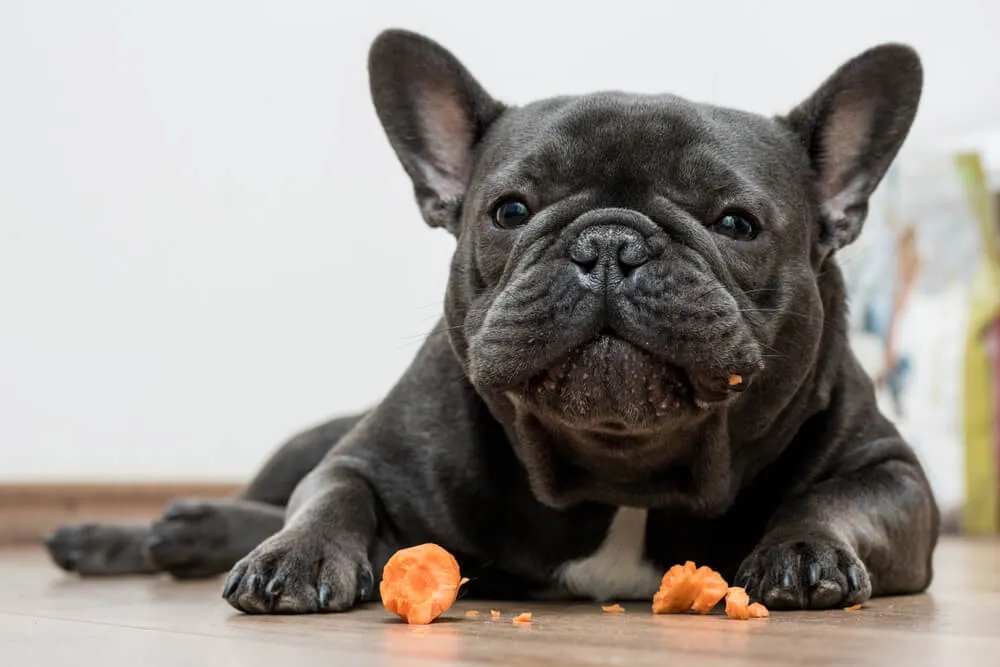French Bulldogs are charming and energetic companions that have captured the hearts of many. Their compact size makes them ideal for various living situations, but their unique physical characteristics also make them prone to certain health issues, including allergies, obesity, and brachycephalic upper airway syndrome. Providing them with proper nutrition is paramount to ensuring a long, healthy, and happy life. Understanding what to feed your Frenchie, and more importantly, what to avoid, is crucial for maintaining their well-being. This guide will help you navigate the complexities of French Bulldog dietary needs and ensure you know exactly what can i give a dog to eat and what to steer clear of.
Understanding Your Bulldog’s Nutritional Needs
Like all dogs, French Bulldogs require a balanced diet rich in high-quality protein, essential vitamins, minerals, and beneficial omega fatty acids. Protein serves as the fundamental building block for muscle development and provides the necessary energy for their playful antics. It’s vital to choose protein sources that are clearly identified and of high quality, rather than ambiguous “animal derivatives” which can often consist of a mix of lower-grade meats. Just as we prefer unprocessed foods for ourselves, our canine companions deserve food made with wholesome, recognizable ingredients to ensure they receive optimal nutrition. When considering what can we feed a dog, always prioritize clarity and quality on the ingredient list.
Feeding French Bulldog Puppies
French Bulldog puppies experience rapid growth during their first six months, demanding a specialized diet to support their development. Due to their small stomachs, they typically require regular feedings, usually three times a day. Their diet should be calorie-dense to fuel this rapid growth phase.
It is essential that puppy food for French Bulldogs contains high-quality proteins and is free from excessive carbohydrate fillers or artificial preservatives. Opt for easy-to-digest foods made with human-grade ingredients whenever possible. Always consult the feeding guidelines on the food packaging and seek advice from your veterinarian regarding portion sizes, especially during vaccination visits. French Bulldog puppies can generally transition to adult food between 9 and 12 months of age. For new puppy owners, knowing what human food can puppies eat at 8 weeks is also important for safe occasional treats.
 A French Bulldog puppy enjoying a meal from a bowl
A French Bulldog puppy enjoying a meal from a bowl
Choosing the Best Diet for Your Bulldog
The sheer variety of dog foods on the market can be overwhelming. To ensure you select a food that genuinely supports your Frenchie’s health and growth, consider these key pointers. Start by scrutinizing the ingredient list. It should be easy to read, featuring whole, recognizable food items. A long list with unfamiliar terms often indicates numerous preservatives and unnecessary fillers. A relatively short ingredient list with clearly stated components like “turkey thigh,” “chicken heart,” or “beef liver” instead of vague “animal by-products” or “animal derivatives” is usually a good sign. The ideal diet for your French Bulldog should also be free from preservatives and high-carb filler ingredients such as potato, rice, oats, barley, pasta, corn, or wheat. When it comes to what foods are good for dogs to eat, whole, identifiable ingredients are always best.
Dog foods come in various forms, including dry kibble, wet (canned) food, dehydrated options, raw diets, and lightly cooked human-grade meals. Regardless of your choice, confirm that the food is nutritionally complete and balanced. If you opt for a raw food diet, meticulous hygiene during preparation is crucial, and it’s highly recommended to discuss this with your veterinarian first.
What Should I Not Feed My Bulldog? Harmful Foods to Avoid
French Bulldogs can enjoy a diverse diet, but certain foods, both in commercial dog food and from our own tables, are distinctly harmful and must be avoided. As previously mentioned, excessive carbohydrates, preservatives, and poor-quality ingredients found in some dog foods are detrimental.
Beyond these, many common human foods are toxic or dangerous for your Frenchie. It is imperative to keep the following foods away from your bulldog:
- Onions: All forms (raw, cooked, powdered) can damage red blood cells, leading to anemia.
- Garlic: Similar to onions, garlic is even more potent and can cause severe toxicity.
- Grapes and Raisins: These can cause acute kidney failure in dogs, even in small amounts. The exact toxic mechanism is unknown.
- Chocolate: Contains theobromine, a stimulant toxic to dogs. Dark chocolate and baking chocolate are the most dangerous.
- Spicy Foods: Can cause stomach upset, vomiting, and diarrhea.
- Chives and Leeks: Members of the Allium family, like onions and garlic, and equally toxic.
- Cherries: The pits, stems, and leaves contain cyanide, which is poisonous. The fleshy part of the fruit is generally safe but should be pitted.
 A French Bulldog looking at a bowl of forbidden human foods
A French Bulldog looking at a bowl of forbidden human foods
If your French Bulldog accidentally ingests any of these foods, contact your veterinarian immediately for advice. Some of these substances can be life-threatening, requiring emergency treatment.
Safe Vegetables for French Bulldogs
The good news is that numerous vegetables are perfectly safe and beneficial for your Frenchie. Incorporating these into their diet in moderation can provide additional vitamins, minerals, and fiber. Safe vegetables include:
- Carrots: Excellent for dental health and rich in Vitamin A.
- Broccoli: Can be given in small amounts, rich in vitamins.
- Green Beans: A healthy, low-calorie treat.
- Celery: Good for freshening breath and providing a satisfying crunch.
- Spinach: High in iron and vitamins, but offer in moderation due to oxalic acid.
- Beets: Provide vitamins and minerals, and can add color to their stool.
- Pumpkin: Great for digestive health, both cooked and unsweetened pureed pumpkin.
These vegetables not only add variety but also contribute to your dog’s overall health. Other ingredients, such as kelp and spearmint in small doses, can also offer health benefits.
 A French Bulldog happily munching on a carrot
A French Bulldog happily munching on a carrot
Common Health Issues in French Bulldogs and Diet
Unfortunately, French Bulldogs are predisposed to several health conditions that diet can significantly impact. Their unique facial structure (brachycephalic) often leads to breathing difficulties, sometimes requiring surgical intervention. They are also prone to dermatitis and various allergies, including food allergies. This predisposition makes it even more critical to feed your French Bulldog a high-quality diet with limited ingredients to minimize the risk of triggering allergic reactions.
Obesity is another prevalent issue in Frenchies, which can exacerbate existing problems like breathing difficulties and lead to chronic inflammation. A reliable dog food will always include a feeding chart indicating the appropriate gram amount based on your dog’s weight. Most adult French Bulldogs typically require between 500-750 calories per day.
According to the American Kennel Club, adult French Bulldogs should weigh less than 28 pounds. If you suspect your dog is overweight, consult your veterinarian. They can assess your dog’s body condition score and weight to determine if a weight loss plan is necessary. Understanding what should i give my dog to eat is key to managing these health concerns.
Conclusion
Providing a high-quality, appropriate diet is fundamental to the health and longevity of your French Bulldog. Given their susceptibility to food allergies and obesity, it’s crucial to select foods with limited, human-grade ingredients and to avoid overfeeding. Being vigilant about what you should not feed your bulldog, particularly common human foods, can prevent serious health complications. Always prioritize clear, recognizable ingredients and consult your veterinarian for personalized dietary advice. By making informed nutritional choices, you can help your beloved Frenchie thrive and enjoy a happy, healthy life.
Frequently Asked Questions
What food is best for French Bulldogs?
French Bulldogs benefit most from a high-quality diet featuring limited, human-grade proteins and free from preservatives and high-carb fillers like potato, rice, oats, barley, pasta, corn, or wheat.
What should French Bulldogs not eat?
French Bulldogs should avoid preservatives and fillers in their dog food. Toxic human foods to avoid include garlic, onions, grapes, raisins, cherries, and chocolate.
What should a French Bulldog eat in a day?
Most adult French Bulldogs require approximately 500-750 calories per day, adjusted based on their activity level and individual needs as advised by a veterinarian.
